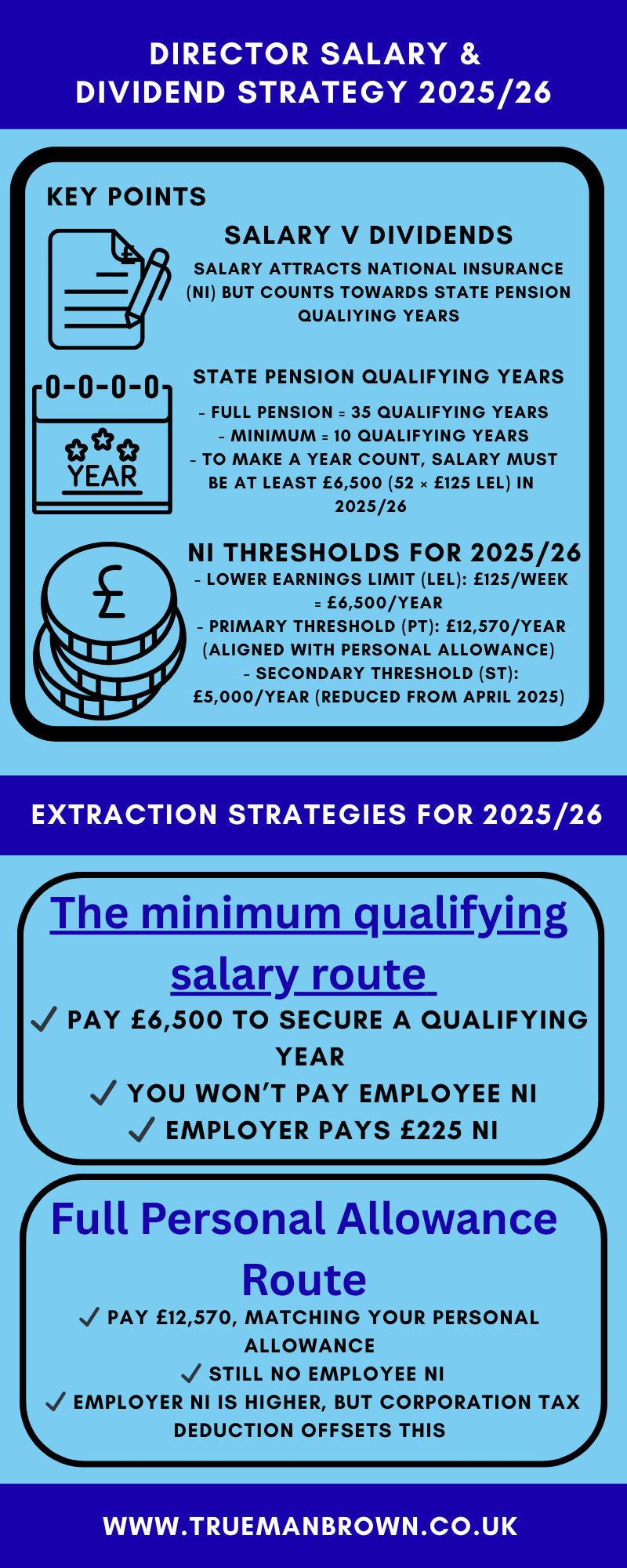Paying the Qualifying Salary for UK State Pension: What You Need to Know
When running a family or personal company, deciding how much to pay yourself as a director is more than just a tax consideration—it’s also about ensuring you secure your future.
Paying the qualifying salary for UK state pension can make the difference between meeting the required years for a full pension or falling short.
Why the Qualifying Salary for UK State Pension Matters
Paying a salary that reaches the National Insurance (NI) lower earnings limit ensures each tax year counts toward this record.
Current Thresholds for 2025/26
For the 2025/26 tax year, the lower earnings limit is £125 per week.
That means you’ll need to pay yourself at least £6,500 annually to meet the qualifying salary for UK state pension.
While dividends are tax-efficient, they don’t count toward pension eligibility—salary or bonuses do.
Between the lower earnings limit (£6,500) and the primary threshold (£12,570), you gain a qualifying year without paying employee Class 1 NI contributions, though employer contributions may still apply.

Balancing Salary and Employer Contributions
Paying the qualifying salary for UK state pension isn’t always straightforward.
For example, directors without access to the employment allowance will face secondary Class 1 NI costs on salary above £5,000. In family companies, where the allowance applies, it’s possible to avoid this additional charge.
Optimising Your Salary for Tax Efficiency
Although £6,500 is enough to meet the qualifying salary for UK state pension, paying a salary of £12,570 may be more efficient.
This higher amount ensures maximum use of the personal allowance while increasing corporation tax relief, often outweighing employer NI costs.
How Trueman Brown Can Help You With The Qualifying Salary For UK State Pension
Navigating the complexities of salary planning and pension eligibility can feel overwhelming. That’s where we step in.
At Trueman Brown, we help directors and business owners balance tax efficiency with securing their pension entitlement.
Whether you’re considering the qualifying salary for UK state pension or broader tax strategies, our expert accountants can guide you every step of the way.
📧 Email: mark@truemanbrown.co.uk
📞 Call: 01708 397262
Frequently Asked Questions About The Qualifying Salary For UK State Pension (FAQ)
1. What is the minimum salary I need to qualify for a UK state pension year?
For 2025/26, the minimum qualifying salary is £6,500 annually.
2. Do dividends count toward my qualifying years?
No, dividends don’t count. Only salary or bonus payments subject to NI do.
3. How many qualifying years do I need for a full pension?
You need 35 qualifying years for a full state pension and at least 10 for a partial one.
4. Can I avoid paying employer NI contributions?
Yes, if you qualify for the employment allowance. Otherwise, employer NI applies once earnings exceed £5,000.
5. Is it better to pay £6,500 or £12,570?
It depends on your situation. While £6,500 meets the minimum requirement, £12,570 often provides better tax efficiency overall.

Recent Comments